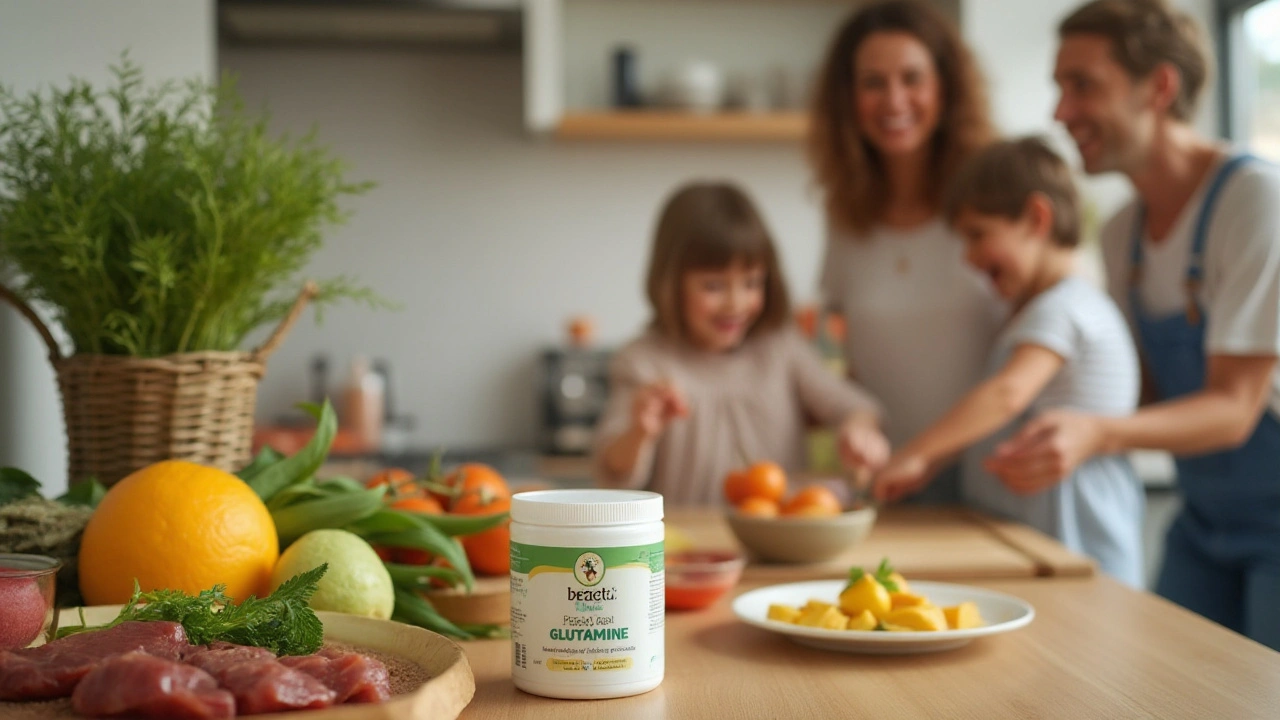Glutamine is an amino acid that packs a punch when it comes to muscle recovery and immune system support. If you're an athlete, a fitness enthusiast, or someone who wants to stay healthy, understanding how glutamine works can offer you significant benefits.
This article delves into what glutamine is, explores its role in muscle recovery and immune health, and offers practical tips on how to incorporate it into your diet for the best results. From athletes to busy professionals, glutamine can make a notable difference in your overall wellness.
- Understanding Glutamine
- Benefits of Glutamine for Muscle Recovery
- Glutamine and the Immune System
- Incorporating Glutamine into Your Diet
Understanding Glutamine
Glutamine is an amino acid that falls under the category of conditionally essential amino acids. This means that while our bodies can produce it naturally, there are certain conditions like intense physical activity or stress where we need to get more from our diet or supplements. This amino acid plays a variety of roles in bodily functions that are crucial for health and performance.
One of the key roles of glutamine is in muscle protein synthesis. When you work out, especially during intense sessions, your muscle tissues undergo stress and get tiny tears that need repairing. Glutamine helps speed up the repair process, ensuring you recover faster and can get back to your routine. This makes it highly valuable for athletes and fitness enthusiasts aiming for rapid muscle recovery.
Besides its impact on muscles, glutamine is also vital for the immune system. Did you know that around 60% of your skeletal muscles consist of glutamine? When your body undergoes stress, it pulls glutamine from these muscles to meet other needs, which can leave the muscles weakened if the supply isn’t replenished. Therefore, having adequate glutamine levels is essential for sustaining immune health. According to Dr. Eric Serrano, a well-known expert in sports medicine, "Glutamine is almost like muscle insurance. Without enough of it, your muscles and immune system could both suffer."
Glutamine is almost like muscle insurance. Without enough of it, your muscles and immune system could both suffer. - Dr. Eric Serrano
But glutamine doesn't just stop at muscle recovery and immunity. It’s also a key player in gut health. It serves as a primary fuel source for the cells lining the gut. A healthy gut lining is crucial for nutrient absorption and preventing harmful bacteria from entering the bloodstream. So, whether you're lifting weights or just trying to keep your body in optimal health, glutamine offers multi-faceted benefits.
If you want to keep your glutamine levels in check, you can start by incorporating foods like beef, chicken, fish, dairy products, and even certain vegetables like spinach and cabbage into your diet. For those who find it hard to consume enough through food, glutamine supplements are a popular alternative. Always consult a healthcare provider before starting any supplement regimen to ensure it suits your individual needs.
In essence, glutamine is more than just a supplement for athletes; it’s a foundational amino acid that supports multiple aspects of your health. From aiding muscle recovery to boosting your immune system and supporting gut health, understanding its role can help you make more informed decisions about your wellness journey.

Benefits of Glutamine for Muscle Recovery
Glutamine is a superstar amino acid, especially for those keen on muscle recovery. It's known to help you bounce back faster after an intense workout. One of the primary roles of glutamine is to serve as a building block for proteins. Since muscles are composed of protein, having ample glutamine is crucial for their repair and growth. This makes it a popular supplement among athletes and bodybuilders. When you exercise, especially if you're lifting weights or engaging in high-intensity interval training, you deplete your glutamine levels. This leaves your muscles vulnerable to breakdown and soreness. So, replenishing your glutamine stash can significantly cut down your recovery time and help you get back to your training regimen quicker.
Moreover, glutamine is known to reduce muscle soreness. If you've ever felt that deep ache in your muscles the day after a rigorous session at the gym, you're familiar with delayed onset muscle soreness (DOMS). Research has shown that taking glutamine can help lessen this soreness. By doing so, it not only aids recovery but also allows you to train more frequently, thereby potentially boosting your gains in the long run. It's like giving your muscles a soothing balm from the inside. Interestingly, a study found that participants taking glutamine supplements experienced a notable reduction in muscle soreness following a strenuous workout. Such findings underscore why many athletes consider it an essential part of their recovery kit.
Another incredible benefit of glutamine is how it supports the body's ability to maintain a positive nitrogen balance. Why is this important? In the world of muscle growth, maintaining a positive nitrogen balance is crucial. When your body is in a state of positive nitrogen balance, it means that you're synthesizing more protein than you're breaking down. This anabolic state is ideal for muscle growth and recovery. Glutamine helps the body to preserve muscle mass, especially in times of stress or intense physical activity. This property makes it indispensable not just for bodybuilders but also for anyone undergoing rigorous physical training.
One lesser-known benefit of glutamine involves its role in glycogen synthesis. Glycogen is the stored form of glucose in your muscles and liver, and it serves as a key source of energy during exercise. After a hard workout, your glycogen stores are depleted, leaving you feeling fatigued. Research suggests that taking glutamine can help in faster replenishment of these glycogen stores. This means you'll have more energy for your next workout and experience less fatigue between training sessions. This is particularly beneficial for endurance athletes who need sustained energy levels over extended periods.
It's equally important to highlight the anti-catabolic properties of glutamine. During strenuous exercise, your body can enter a catabolic state where muscle tissue is broken down for energy. This is counterproductive if your goal is to build or maintain muscle mass. By supplementing with glutamine, you can help shift your body back into an anabolic state more quickly. This means your muscles are being built up rather than broken down. Some athletes even take glutamine before bedtime to help support overnight muscle recovery.
"Glutamine supplementation has been shown to minimize breakdown of muscle and improve protein metabolism," says Dr. John Ivy, a leading expert in sports nutrition.
It's clear that glutamine plays several key roles that make it an essential amino acid for anyone serious about muscle recovery. Whether it's enhancing protein synthesis, reducing muscle soreness, or supporting glycogen replenishment, the benefits of glutamine extend beyond just muscle repair. They encompass various aspects of muscle maintenance and growth, making it a go-to supplement for athletes of all levels.

Glutamine and the Immune System
Glutamine is more than just a building block for proteins. This amino acid plays a crucial role in maintaining a robust immune system. Found in large amounts in your muscles, glutamine is also pivotal for several key functions in the bloodstream. But how exactly does this amino acid boost immunity?
For starters, glutamine serves as a primary energy source for your white blood cells, often referred to as the soldiers of the immune system. White blood cells rely heavily on glutamine to function effectively, allowing them to fight off infections and eliminate harmful pathogens efficiently. During periods of stress or rigorous exercise, your body's glutamine levels can drop significantly, compromising immune function.
Studies reveal that glutamine supplementation can help maintain these levels, ensuring your immune system remains strong. According to a study published in the Journal of Nutrition, supplementing with glutamine has been shown to reduce the incidence of infections in endurance athletes. This makes it particularly beneficial for those involved in high-intensity sports or physically demanding occupations.
Dr. Eric Robinson, a leading immunologist, states, "Glutamine is indispensable for the optimal functioning of the immune system. Supplementation can make a significant difference, especially in high-stress environments."
Additionally, glutamine contributes to healthy gut function, another vital aspect of immune health. The intestines are not just critical for digestion; they're a hotbed of immune activity. The cells lining your gut (enterocytes) use glutamine as a fuel source to regenerate and maintain the gut barrier. This barrier keeps harmful bacteria and toxins out of the bloodstream.
With approximately 70% of your immune cells located in the gut, supporting intestinal health through adequate glutamine intake can significantly bolster your immune defenses. Research from the American Journal of Clinical Nutrition advocates for glutamine's role in supporting the gut-associated lymphoid tissue (GALT), which plays a key part in immune function.
Beyond gut health, glutamine also assists in the production of other immune-boosting compounds like glutathione. Glutathione is an antioxidant that helps neutralize harmful free radicals in the body. Higher levels of glutathione are associated with a more effective immune response, making glutamine a multi-faceted player in maintaining health.
If you're looking to support your immune system, incorporating glutamine-rich foods into your diet can be beneficial. Foods high in glutamine include meats, dairy products, eggs, and beans. For those who find it challenging to get enough through diet alone, glutamine supplements are an effective alternative.
Maintaining a balanced diet, managing stress, and ensuring adequate rest are all part of a holistic approach to immunity. Nevertheless, the inclusion of glutamine, either through diet or supplementation, can provide that extra edge in keeping your immune system in prime condition. So whether you're an athlete pushing your limits or simply aiming to stay well, leveraging the power of glutamine can be a game-changer for your immune health.

Incorporating Glutamine into Your Diet
When it comes to adding glutamine to your daily intake, there are plenty of ways to do it effectively. First and foremost, it’s helpful to know which foods are naturally rich in glutamine. This way, you can easily incorporate these into your meals and take advantage of their muscle recovery and immune-boosting benefits.
Some of the top natural sources of glutamine include beef, chicken, fish, and dairy products like milk, cheese, and yogurt. These animal-based foods are not only rich in protein but also pack a decent amount of glutamine. For those who prefer plant-based options, you can still get your fill from foods like beans, spinach, cabbage, and nuts, which offer a good dose of this essential amino acid.
Of course, dietary supplements are another popular way to ensure you're getting enough glutamine. Protein powders, available in various flavors, often include added glutamine to not only enhance muscle recovery but also support immunity. When choosing a glutamine supplement, make sure to look for a reputable brand and check the nutrition label for purity and dosage.
For fitness enthusiasts, it’s usually recommended to consume about 5-10 grams of glutamine post-workout to maximize recovery. Adding this to your protein shake or smoothie can help reduce muscle soreness and speed up recovery. Combining glutamine with other amino acids like BCAAs can further enhance its effectiveness. Always start with a smaller dose to see how your body reacts and gradually increase based on your individual needs and fitness goals.
Some folks prefer to take their glutamine supplement first thing in the morning or right before bed, as these times can help support muscle maintenance and repair while you sleep. Experiment to find the schedule that best supports your lifestyle and energy levels. Remember, consistency is key to witnessing the best results from any supplement regimen.
According to a study published in the American Journal of Clinical Nutrition, “Glutamine has been shown to influence gut barrier function, preserve lean muscle mass, and enhance immune function,” highlighting its integral role in overall health.
Incorporating glutamine into meals is also a smart move. For example, a grilled chicken breast paired with a side of sautéed spinach not only makes for a delicious dinner but also provides a glutamine-rich meal to support your fitness and health goals. Don’t shy away from experimenting with recipes and finding meals that incorporate glutamine-rich foods you enjoy.
Lastly, staying hydrated is important when taking any supplement. Water helps transport nutrients throughout your body, ensuring that glutamine and other essential nutrients are absorbed efficiently. Aim to drink at least eight glasses of water per day, especially if you’re leading an active lifestyle.


Write a comment